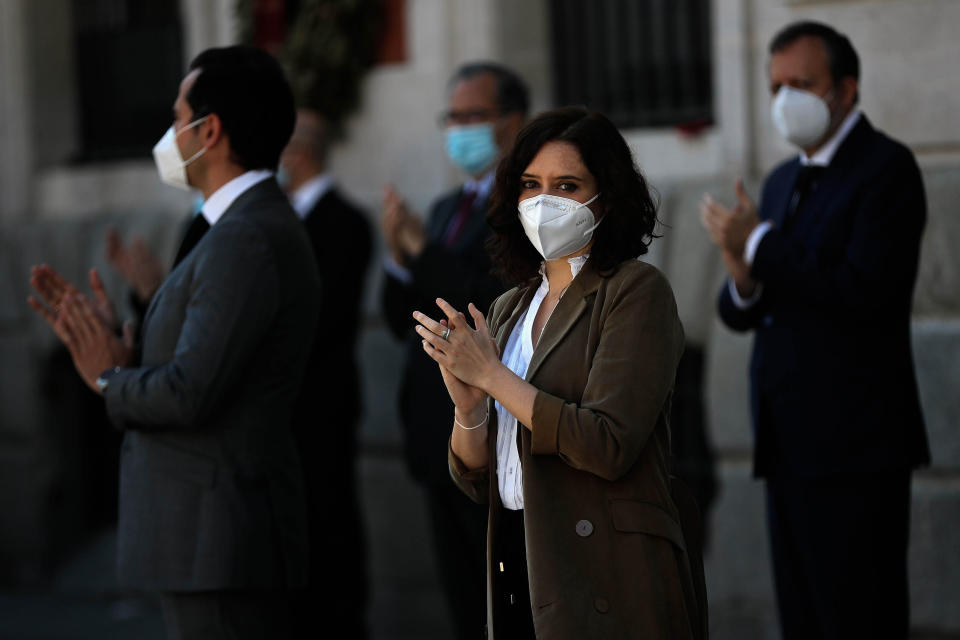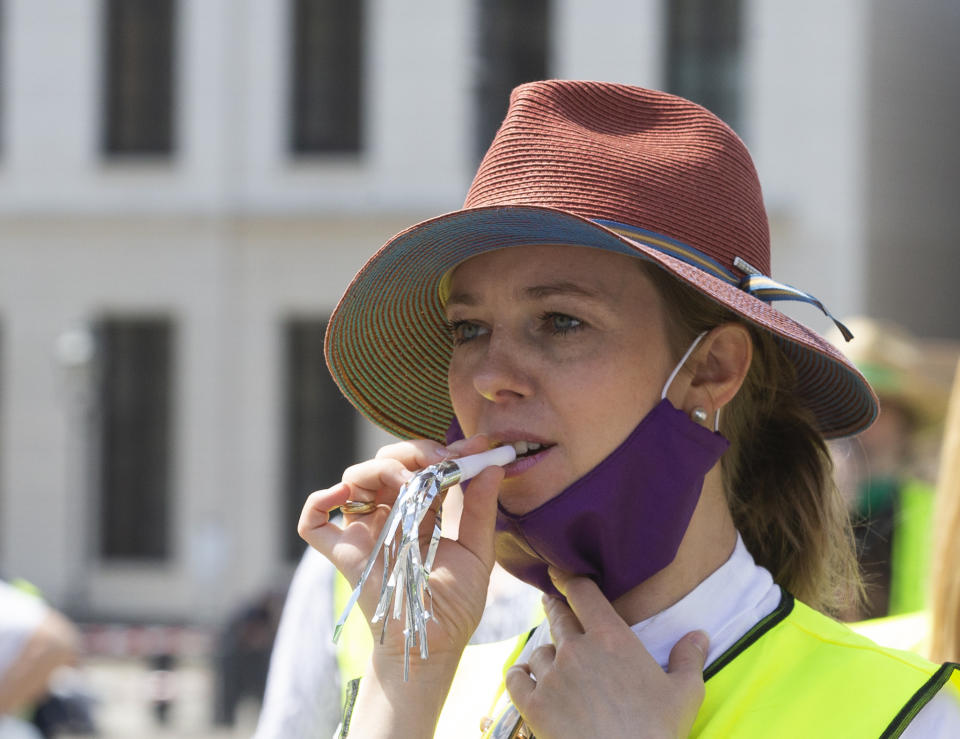Coronavirus: Deliberate infection of volunteers for vaccine is 'ethical', insists chemist

A chemist has insisted deliberately infecting volunteers with the coronavirus to help develop a vaccine can be ethical.
With the UK on lockdown, government officials have warned life may not go completely back to normal until an effective jab becomes available.
Scientists around the world are racing to develop a vaccine, however, ethicists have warned “crises are not an excuse to lower standards”.
Nevertheless, Dr Adair David Richards from the University of Warwick has argued shortening the development process by just a few weeks could save a significant number of lives.
He has suggested “human challenge methods” that deliberately infect patients to test the effectiveness of a vaccine.
Despite the approach’s controversies, Dr Richards concluded it “may be possible to maintain current ethical standards yet still permit human challenge trials in a context where delay is critical”.
Early research suggests the coronavirus is mild in four out of five cases, however, it can trigger a respiratory disease called COVID-19.

Coronavirus: Speeding up a vaccine ‘could save many lives’
Once a vaccine has been shown to be safe and effective in the laboratory, it is usually tested in the thick of an outbreak.
“With new infections dropping in the countries where research is taking place, it may be a long time before many of the volunteers in these experiments naturally come into contact with the disease,” said Dr Richards, who leads research ethics training for postgraduates.
“Deliberately infecting volunteers with a disease as dangerous as COVID-19 has previously been considered to be unethical by the research community.
“However, I believe the current global situation is so different to those previously faced, that it is ethical in this case.
“Speeding up vaccine development even by a few weeks or months could result in saving many lives”.
The UK’s lockdown was implemented after a model suggested allowing the coronavirus to ravage freely through communities, while creating herd immunity, would inevitably overwhelm the NHS.
To avoid this, officials have warned social distancing will be required to some extent until a vaccine or effective drug becomes available.
Although there is no guarantee, scientists are making progress when it comes to a jab.
“However, in the case of the current pandemic, time is crucial, and a delay even of weeks or months may result in a very large number of deaths that could potentially have been prevented,” Dr Richards wrote in the Journal of Medical Ethics.
The development of a vaccine typically takes years, with different study phases having to be completed.
“Methods that can significantly shorten these phases can be considered desirable or even necessary if it is ethical to do so,” wrote Dr Richards.
“The primary methodology which could shorten these phases currently identified could be by using human challenge experiments – that is, deliberately infecting volunteers with COVID-19 after giving them the vaccine candidates.”
Delays will ‘come at significant human cost’
This approach carries “obvious risks”, namely that volunteers will become seriously ill or die, even if they seem healthy and at low risk.
Safety aside, the jab created may not even be viable.
The issue of a volunteer truly consenting to the “experiment” also raises alarm bells.
“A potential participant may experience psychological pressure as a result of their own fear or desire to make a social contribution, real or perceived pressure from friends, or a potential societal pressure to speed up vaccine development,” wrote Dr Richards.
Other concerns include damaging the reputation of scientists, as well as setting off a “slippery slope” towards unethical vaccine development.
Nevertheless, Dr Richards stressed, “delay for sober contemplation and slow ethical guideline developments will, in this instance, come at significant human cost”.
He argued people are already free to “make choices that pose significant risks to their health”, like smoking.
“It is not uncommon for a society to ask soldiers to go to war where there is significant likelihood of serious injury or death and the outcome of their work is uncertain,” added Dr Richards.
While an effective vaccine cannot be guaranteed, it could take just one viable jab to change the course of the pandemic.
When it comes to consent, Dr Richards argued it may “withdraw from a person’s humanity and autonomy to deny them the opportunity to offer their consent to partake in research that could result in such a potentially large societal benefit”.
Public confidence in scientists may also be undermined if they choose not to carry out such experiments, he added.
“It could be argued that to allow such experiments would not be changing our ethical standards, merely applying them to this new context”, wrote Dr Richards.
“My research shows it is incorrect to rule out human challenge experiments as unethical in relation to COVID-19 vaccine development,” he added.
“I argue you can apply the same standards of ethics, but they lead us now to a different conclusion because the facts are different.
“Very large numbers of people globally are affected both directly and indirectly from COVID-19, and the saving of a few weeks or months of time in vaccine development can be expected to result in saving a large number of lives.
“There are also good ways to minimise the risk of harm to volunteers, and it is ethical, and I argue, admirable to allow a volunteer to choose to take a personal health risk to help serve a greater benefit to humanity.”

What is the coronavirus?
The coronavirus is one of seven strains of a virus class that are known to infect humans.
Others cause everything from the common cold to severe acute respiratory syndrome (Sars), which killed 774 people during its 2002/3 outbreak.
Since the coronavirus outbreak was identified, more than 5.6 million cases have been confirmed worldwide, according to Johns Hopkins University.
Of these cases, over 2.3 million are known to have “recovered”.
Globally, the death toll has exceeded 351,000.
The coronavirus mainly spreads face to face via infected droplets expelled in a cough or sneeze.
There is also evidence it is transmitted in faeces and can survive on surfaces.
Symptoms include fever, cough, fatigue, slight breathlessness and a loss of smell or taste.
The coronavirus has no “set” treatment, with most patients naturally fighting off the infection.
Those requiring hospitalisation are given “supportive care”, like ventilation, while their immune system gets to work.
Officials urge people ward off infection by washing their hands regularly and maintaining social distancing.
Coronavirus: what happened today
Click here to sign up to the latest news, advice and information with our daily Catch-up newsletter
Read more about COVID-19
How to get a coronavirus test if you have symptoms
What you can and can’t do under lockdown rules
In pictures: How UK school classrooms could look in new normal
How public transport could look after lockdown
How our public spaces will change in the future
Help and advice
Read the full list of official FAQs here
10 tips from the NHS to help deal with anxiety
What to do if you think you have symptoms
How to get help if you've been furloughed


